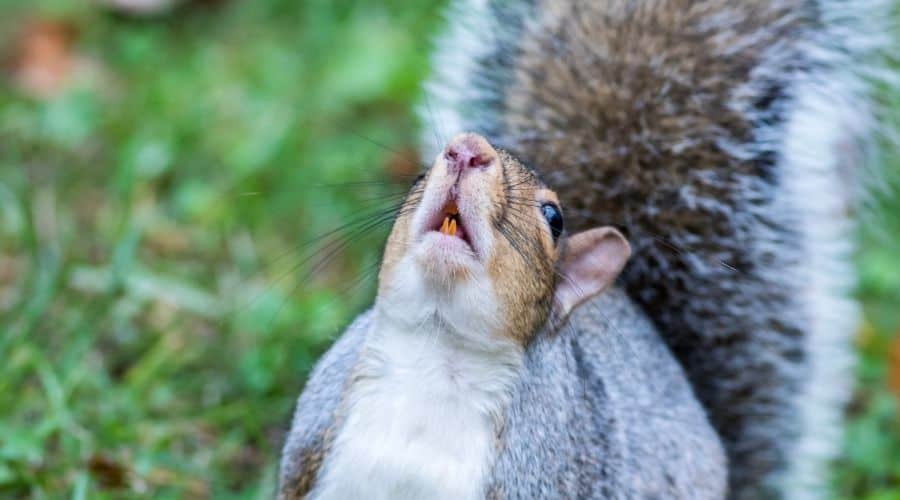Squirrels are rodents, and like their cousins, the beavers, their teeth are continually growing, which puts them in quite the predicament. When your teeth never stop, you can either chew all the time to wear them down and sharpen them, or eventually, they’ll overgrow and curve.
Teeth that grow until they pierce your skin isn’t a good look. What do squirrels sharpen their teeth on?
Squirrels sharpen their teeth on wood, aluminum, metals and by simply grinding them against each other. Cracking nuts requires a powerful jaw with sharp teeth so squirrels will chew on decks, trees, rocks and even lamps in order to sharpen their prominent incisor teeth that never stop growing and to strengthen their jaw.
Table of Contents
How Do Squirrels Sharpen Their Teeth
A squirrel’s natural seeds, nuts, and fruit diet is surprisingly hard on their teeth. That would be a problem for most animals, but not these adorable fluffy rodents.
When your incisors never stop growing, you have to do something to wear them down. Sadly, eating isn’t enough.
To wear down and sharpen their teeth, squirrels are always looking for something to gnaw on to keep their teeth manageable.
Almost any hard, rough surface will do. Unfortunately, that can mean a lot of trouble for homeowners and sometimes for the squirrels.
Here are 5 ways squirrels sharpen their teeth:
1 – Wood
Most squirrels make their homes in trees. These arboreal rodents have a ready source of rough material all around them constantly.
Tree squirrels will chew on the trees they live in and play in to sharpen their teeth.
Squirrels are not the brightest of creatures, and they don’t distinguish between natural wood and the kind that humans have adapted for building.
That means that many homeowners in squirrel-heavy areas have a problem. Squirrels will chew on fences, houses, and any other source of wood to keep their teeth sharp.
2 – Rocks
Chewing on rocks might not seem appealing to you and me but, grey squirrels, in particular, likely use them as a way to sharpen their teeth.
Other squirrel species are not known to hoard pebbles, but this specific squirrel species does. While it’s easy to assume it’s a foolish mistake, squirrels are very proficient at choosing seeds and nuts that are ripe and unspoiled.
They have an excellent sense of smell, so it’s improbable that the stone caching behavior is an accident.
Wildlife Online recounts a story from a biologist about this habit, saying, “The squirrel had been stealing pebbles, each about the size of a walnut (i.e. approx. 5 x 3.5cm / 2 x 1.5 in.), every day for weeks—to the point where Ms. Salmon needed to buy some more. This curious behavior continued until at least the end of February. Apparently, the squirrel, one of several visiting the property, would come into the garden and make straight for the pebbles, ignoring the food put out, and carry one off somewhere.”
3 – Aluminum & Wires
Aluminum is a relatively soft metal. Though that makes it easy to work with for humans, it also means this particular metal is better for squirrels who gnaw on anything worthwhile.
A squirrel can chew right through an aluminum panel to let themselves into your house. Once inside, they make themselves at home and may store a cache for winter.
In addition to chewing metal panels, they will also gnaw through wires made of copper and other metals. Regrettably, this can be deadly for the squirrel if the wire conducts enough electricity.
4 – Grinding
Another simple way squirrels can sharpen their teeth is on their other teeth. By grinding their upper and lower incisors together, they can help wear down the constant growth.
Plus, teeth are incredibly durable, making them an ideal surface for chipping and sharpening other teeth.
5 – Bones
Squirrels need sharp teeth, but they also have high calcium requirements. Luckily, that means bones found in nature can make an ideal solution for their needs.
By gnawing on animal or even human bones, squirrels get a much-needed calcium boost and wear their teeth down to manageable, sharper shapes.
Squirrels chewing on bones can cause problems for crime scene investigators.
As Boston Universities’ The Brink explains, “The squirrels showed a preference for gnawing on long or dense bones, like the femur and ulna, which are part of a deer’s legs, or the calcaneus, which is part of the heel. In general, the squirrels gnawed on the ends and margins of the bones, sometimes completely changing their shape. “
Why Squirrels Have To Sharpen Their Teeth
Squirrels don’t just sharpen their teeth for fun. They need them to cut through the outer shells of nuts that make up a large part of their diet.
However, squirrels use those sharp teeth for more than food. For example, a squirrel will defend itself by biting.
Additionally, they use their jaws and teeth to get inside human homes and other spaces to cache their winter food stores.
Helpful Tips To Know About What Squirrels Sharpen Their Teeth On
A desperate squirrel isn’t very discerning. It will chew on your porch, fence, or anything else that it can get its jaws around.
However, in nature, squirrels will chew on tree bark and thought nuts to file down and sharpen their continually growing teeth.
Here are a few more helpful tips to know about what squirrels sharpen their teeth on.
- Sharp, strong teeth are only as good as the jaw that drives them. A squirrel has a bite force up to 7,000 pounds per square inch (psi). To put that in perspective, a lion has a bite force of around 650 psi. Lucky for us squirrels are small and eat mostly vegetarian.
- Newborn squirrels have no teeth and nurse on milk like other mammals. They get their lower incisors first, around three weeks old, and a week and a half later, their upper incisors emerge. After that, they will have to gnaw and sharpen their teeth like any adult rodent.
- Sectioning a squirrel’s teeth can tell you how old it is. Much like the rings of a tree, squirrels get a layer of cementum that is wide and opaque in summer and then another darker, narrower band at the base of their molars in winter.
Final Thoughts
Chewing is a habit of most rodent family members, like squirrels, for a good reason. Imagine what it would be like to teethe all the time and have teeth that never stopped growing.
Overgrown teeth cause pain and can eventually get infected. A broken tooth can spell death for a squirrel that needs to sharpen its front teeth evenly.
Squirrels need to find tough surfaces like wood or aluminum to chew on regularly. Not only does sharpening keep their teeth from overgrowing, but they use them for self-defense as well.
Plus, cracking nuts requires a strong jaw with sturdy, wickedly sharp teeth. Oral hygiene and tooth care are crucial to squirrels, so they chew and sharpen.

